
For those of you interested.
Amusing and bemusing rants and raves. Unabashed tomfoolery. An imaginary audience.
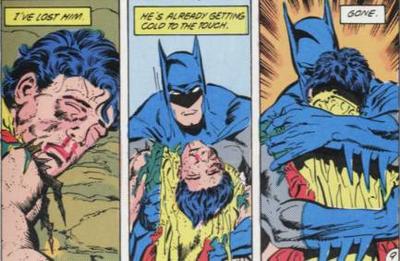 Jim Aparo died less than twenty-four hours ago, at the age of 72. I'd say he was one of the most underrated artists in comics... he was a highly capable workhouse who drew some damn fine comics. His work was sharp and crisp, but sturdy and solid. His heroes were carved out of granite, and his work was infused with an understated power, an intensity hidden within the lines. He pencilled, inked, and even lettered an awful lot of fine comics.
Jim Aparo died less than twenty-four hours ago, at the age of 72. I'd say he was one of the most underrated artists in comics... he was a highly capable workhouse who drew some damn fine comics. His work was sharp and crisp, but sturdy and solid. His heroes were carved out of granite, and his work was infused with an understated power, an intensity hidden within the lines. He pencilled, inked, and even lettered an awful lot of fine comics.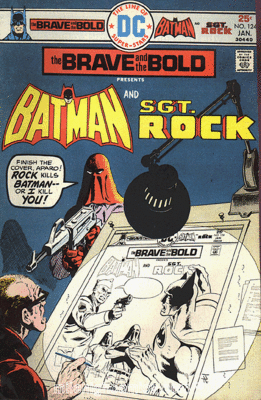 He was cool. And now he's gone. He'll be missed.
He was cool. And now he's gone. He'll be missed.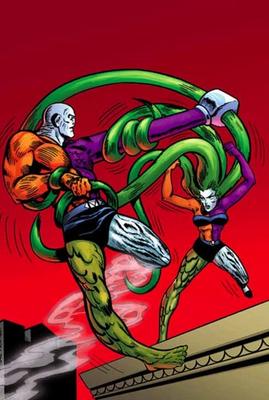 You might be able to expect another "Doom Patois" column from me once volume two arrives in the mail. It'll be posted here if it's extra-long, probably, although it may show up on CSBG. I haven't decided. Maybe I won't even get around to writing it.
You might be able to expect another "Doom Patois" column from me once volume two arrives in the mail. It'll be posted here if it's extra-long, probably, although it may show up on CSBG. I haven't decided. Maybe I won't even get around to writing it.
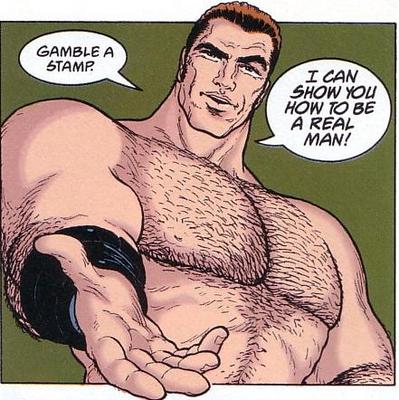
Anyway, the superheroes. I agree with my pal and fellow mad writer Andrew M. Dean's statement: "Superheroes are the greatest literary invention of the 20th century." I've found myself repeating that a lot, mainly because it is utterly true and should be shouted from the rooftops. Other writers might find it a bit silly that quite a few people think of superheroes as a modern mythology, but not I. No, I think the idea of the superhero, and quite a few executions of that idea, are primal representations of humanity’s spirit, dreams, dignity, and all that good stuff. The superheroes were born out of the cultural zeitgeists of their times, and plucked from the archetypal Jungian soup of our collective unconscious (if you believe in that sort of thing). I think that the comic book is a wonderful medium, the ultimate collaborative art form and a powerful storytelling method that’s gotten a bit lost in the corporate shuffle. Still, if there’s one thing comics do best (well, one of many things), it’s superheroes.
No other comic teaches this lesson better than Flex Mentallo, a four issue mini-series from 1996 by Grant Morrison and Frank Quitely (the same two that brought us JLA: Earth 2, New X-Men, We3, and soon, All Star Superman). It is the ultimate love letter to superheroes and the comics art form. It was also the subject of a lawsuit against DC/Vertigo by the Charles Atlas people, because, well, the character of Flex Mentallo (who first appeared in an issue of Morrison’s Doom Patrol) is, in its basest form, a parody of the old Charles Atlas bodybuilding ads. Anyway, DC won the case but has shied away from reprinting Flex in a trade paperback, so the comic is dreadfully rare and obscure. It sells for lots of money on eBay relatively regularly though, so buy it if you’ve got the bucks. If you don’t, you can always download it (“But remember kids, downloading comics is wrong!”).
Before I begin, I’d like to mention that you can find annotations for Flex by clicking here, but they probably won’t do you much good if you don’t have the book itself.
Now, what’s the comic about, you ask? Well, that’s... complicated. It would take me pages and pages to explain and analyze this comic fully, and it still won’t be worth it if you don’t have access to the book, which most people, sadly, do not. The book is an experience. It broke my brain and changed my view of the world and my writing. So, yes, it’s profound, and profoundly important to me personally. In this limited blog space, hopefully I’ll be able to cover the basics, talk it up a bit, throw some panels at you (remember: copyright, Morrison, Quitely, DC/Vertigo, etc.), and get you interested in seeking it out, that is, if it ever comes out in TPB form.
Flex Mentallo covers quite a few myriad plot threads which are all connected and all come together by the end, literally and thematically and all that. Part of it is about Flex Mentallo 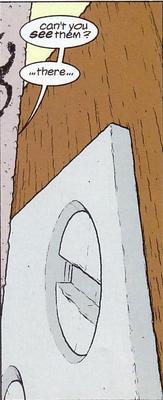
It’s a post-modern, fairly self-aware comic. It tells an adventure of the character Flex Mentallo while flashing back to his past, fictions within fictions. Meanwhile, Wally Sage’s life is flashing before his eyes, and we visit his past, his memories of the past, his dreams, and his hallucinatory acid trips. The reader is never quite sure what timeline or reality the narrative is taking place in, but that doesn’t quite matter to the plot. I’ll let the introduction from the annotations site explain further:
“Grant Morrison and Frank Quitely's Flex Mentallo, on the other hand, does not place its heroes within a novelistic or realistic world--a linear world--but rather within a fragmentary matrix of parallel universes and alternate realities, within a wild and meta-aware history of comics itself. Flex Mentallo is a comic about comics; it revels in the traditions of superhero comic books--narrative, semiotic, and corporate alike--even as it critiques them. It is an absolutely brilliant work, but it is, in many ways, an ‘inside joke.’”
To understand the book, one really has to have experience with superhero comics history. Each issue seems to be structured akin to a different comics era. There is the Silver Age issue, the Grim-and-Gritty issue, etc. The comic is at times a pastiche of superhero comics, but it’s also a loving tribute to them, filled with homages and references.
Yet, as we read, we never know what is “real,” what is a “fiction.” In truth, it is all of the above all at once. In the final issue, and I’m going to spoil a bit of the magic for you, if you don’t mind, Flex Mentallo battles the Man-in-the-Moon, who turns out to be the disillusioned teenage Wally Sage. At the same time, the adult Wally Sage is traversing his own psyche, through parallel worlds of being. He decides, in the end, that he never took any drugs, that they were, in fact, M&Ms, and so saves himself just as Flex Mentallo is *also* saving him. We learn that, some time ago, in another reality, the superheroes, in order to save their own universe, became fictional in ours.
“Welcome,” says the comic. “You have been inhabiting the first ultra-post-futurist comic: characters are allowed full synchrointeraction with readers on this level.” It is after this that Wally Sage discovers and says the magic word that brought the universe into being, and the world is transformed; the superheroes become real once more, seen in a breathtaking final page as they soar into the sky. It all hinges on the power of belief; belief in life and love and comics and superheroes and the world. It gives us hope for the world and the future, and a renewed appreciation for the concept of the superhero.
I’m not sure all of the above made sense. What I do know is that Flex Mentallo is a helluva ride, and it made me believe in superheroes. It’ll do the same for you. And that, my friends, is why it is better than Watchmen. Flex gets a 10/10, ‘natch.
In future installments, I may revisit a few more Flex bits, and also go over some more of my favorite comics. I’d like to keep this dealy regularly updated, but I’m also making stuff up as I go along.
I think, in yesterday's post, I called KYB "joycore." I could be wrong. Either way, I believe it to be so. Now, I get mocked a lot for talking about this "joycore" thing, but it's a philosophy that became completely apparent to me as soon as I heard the word. What is it, you ask? Well, the term originated via a Barbelith regular who needed a word to describe a specific feeling, that innate feeling of fist-pumping joy and awesomeness. And so joycore was born. There are numerous Barbelith threads on it. An explanatory one is here. Have some quotage, from 'Saveloy':
The word 'joycore' was invented by a Barbelith regular who most of the people here will know as Flux. He first used the term in his blog when, commenting upon a song by The Danielson Famile, he said something along these lines: "this is the most joyful tune ever made. Somebody should invent a movement for this sort of thing, and they should call it JOYCORE." A week or two later, the first joycore threads appeared on Barbelith.
As I understand it, joycore is pro things that make you go "woo-hoo!" and "yay!", and anti things that say "bah!" and "feh..." and "Pah!"
The opposite of 'joycore' is 'borecore,' which I suppose you can now figure out.
Flux: "Joycore is fairly self explanatory. It's a pro-fun, pro-imagination, self-empowering, anti-borecore philosophy. Nick's fixation on the image threads misses the point quite a bit - the threads on Barbelith give a lot of hints and clues as to what Joycore is (and a lot of its meaning is ultimately up to you, should you embrace it), but those threads are only a manifestation of the Joycore spirit, not by any means the totality of what it's all about. Ideally, Joycore and Borecore should be used as adjectives."
Personal examples of things that I find joycore include: Amazing Spider-Man Annual 1, by Stan Lee and Steve Ditko, featuring Spidey vs. the Sinister Six; Fantastic Four #5, by Stan Lee and Jack Kirby, introducing Dr. Doom and involving time-travel and pirates; Batman: The Movie, starring Adam West and Burt Ward in 1966, which I just rewatched today for the first time since I was a wee lad, and found to be absolutely awesome in its glorious and campy joycoreity (exploding sharks! pirates! engines to power! turbines to speed!); Jack Kirby’s DC work in the 1970’s, especially OMAC; Kill Your Boyfriend.
The concepts of "joycore" and "pop comics" don't necessarily go hand-in-hand, but they easily can. Most of my ideas for pop comics could be considered joycore by the right people, and I hope such a thing occurs. Who are these people? Well, I equally hope that they are members of the "New Mainstream," which is a bit of a silly term, but important nonetheless.
Now, there's a book by the name, but that's something else entirely. No, my idea of the New Mainstream has everything to do with, you guessed it, comic books. In the comic book industry, the word "mainstream" is distinctly opposite what the word means in every other form of pop culture. There, mainstream is anything that'll appeal to mass audiences. In comics, mainstream is anything that'll appeal to, sadly, hardcore comic nerds. This means one thing: Comic mainstream = Superheroes.
Now, I love superheroes, don't get me wrong. They really *are* the greatest literary invention of the 20th century like me pal Andy "The Dean" Dean says. When done right, they rock. When done wrong, which is much more frequent, they suck arse. Still. Fans (and fanboys) love their superheroes. There's nothing inherently wrong with that, it's just that that's all the comic industry seems to be, at least to an outside observer.
When one looks outside Marvel and DC, one sees much more new and diverse material. These independent publishers dabble in every genre imaginable, and some contribute very nicely to the comics medium as an art form. It's here where the *true* mainsteam lies, and where I think we can find a "New Mainstream" if we try hard enough. More and more independents are getting noticed in the media, even by high-falutin' book reviewers and the like. Art Spiegleman and Dan Clowes and friends are on bookstore shelves and on NPR and in the New York Times Book Review and all that, and they're given their proper due. Real people, intelligent people, are reading and liking comics... just not the ones with superheroes.
Comics need much more diversification in order to capture this new audience. The independents are doing pretty well, but DC and Marvel comics need to stop mollycoddling the fanboys and appeasing the hardcore nerds (yes, including myself, at times), and publish something other than superheroes. Superheroes aren’t bringing in new readers. The Big Two is preaching to the choir, no matter how hard they try not to. They need to experiment, to do new and different things and try new and different genres. Yes, they’ll fail at times, they might not make a lot of profit in the beginning... but in the long run, they may get a much larger audience interested in them.
I have lots of ideas for pop comics. I hope to write these and get them published. I want to share them with the world. Pop comics are the perfect tool to get new audiences interested in the comic medium, and hopefully I can contribute to this movement, and help find this new, important audience.
There’s a whole new mainstream out there. Find it, chase it, cuddle it, make love to it. It wants what we’re selling, it just doesn’t know it yet.
Bonzai, mofos.
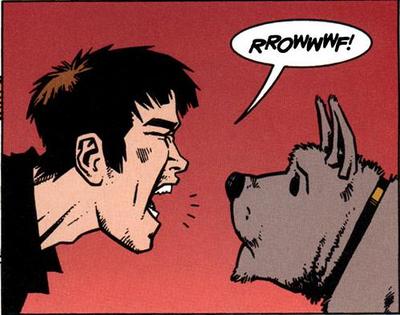
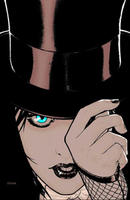

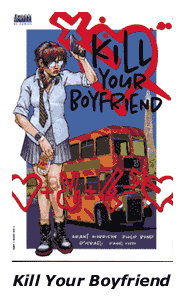 ch you've already heard my thoughts about), but this is about Kill Your Boyfriend, which I shall shorten to KYB, like all the cool kids.
ch you've already heard my thoughts about), but this is about Kill Your Boyfriend, which I shall shorten to KYB, like all the cool kids.
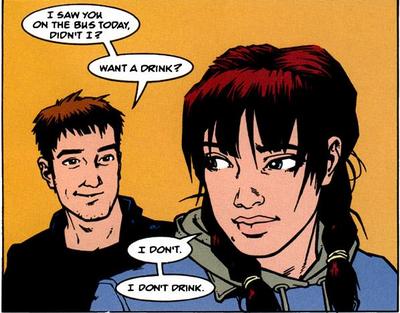

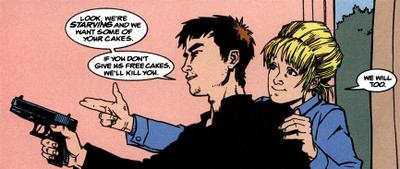

So it’s come to my attention that three or so people peruse this blog on occasion, and I’ve let it fall by the wayside, which might disappoint them. Then again, I may have hallucinated them when I was on the Vicodin. (I had a prescription, dammit! Don’t hound me, varlets!)
Anyway, let’s get up to date: It’s been a helluva month, from late May through June! But I’ve survived, and hopefully have a good month-and-a-half of boredom ahead of me. So I’ll do some writing, I guess, which may include this little bloggy-type dealy, though if certain events spring into motion, I may fold this into another website which will have much better content, commentary, and, perhaps, webcomics. Of course, places like Comic Book Galaxy and Millarworld are doing fantastic comics/pop culture commentary right now, so maybe there is no longer a place for my dream. Still, I’d like to give it a go. Also, I’ve got plenty of ideas for a few little Parodyverse ditties, as well, as several premises for pop comics (Warren Ellis originated the term, and I’d link to where I read about it, only I just searched for fifteen minutes and couldn’t find a damn thing. So do your own research, sorry!) that I’d like to write pitches and/or scripts for, sometime. So I’ve a lot to do, and not much time to do it! Which generally means I’ll get nothing done. Go me!
To sum up what’s happened during my long absence, ‘cause I haven’t been around on here since March, unless you count that quick post in May, it all fits into one sentence: “I hate my life.” Naturally, there’s more to it. Let’s see... School ended, stuff happened, I went to social events, I took a vacation with friends, I’ve had my heart broken and my spirit crushed and neither of them are mended yet (let’s put it this way: I can’t listen to Billy Joel music anymore, without getting utterly depressed), and, oh yes, I’m deathly afraid of life and the future. I think that about does it right there, don’t you? Let’s move on.
My God, I just checked: this blog is nearly a year old! That was fast. I’m not so sure “The Lithium Age” is a good name for this one-sided forum anymore, but I don’t care! So it stays, for now, until I start a new, hopefully more regular column somewhere else, where I may come up with something better. It’s not that I don’t believe in the message of the Lithium Age (check the archives, dammit!) but it’s not like I’ve focused on it much.
Let’s do that now, then. What are good comics that are following the standards of the Lithium Age? What’s bringing us into a new age of imagination and quality? I’ll tell you.
1. Grant Morrison’s Seven Soldiers: I could rave about this, and go on and on and on, but I think this column here says everything I want to, only better. It’s good, quality comics, done in a way no other comics have been done before. It’s a huge pile of material, and it’s all new and different. So far I’d say Shining Knight and Zatanna have been the best mini-series (the others being Manhattan Guardian and Klarion the Witch Boy, both of which are very good) so far. Morrison is a pioneer in the comics medium, and he’s the best and most imaginative author working in the field today.
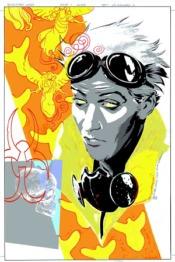 2. Desolation Jones: This is a new book by Warren Ellis and JH Williams III and friends, and it’s a detective book starring a strange, gray-toned man with a trenchcoat, blanket, and gas mask, who lives in LA, which is actually an open prison for ex-spies and the like, and a very weird place indeed. I hope you don’t mind if I basically copy and paste some material I posted over at Barbelith here.
2. Desolation Jones: This is a new book by Warren Ellis and JH Williams III and friends, and it’s a detective book starring a strange, gray-toned man with a trenchcoat, blanket, and gas mask, who lives in LA, which is actually an open prison for ex-spies and the like, and a very weird place indeed. I hope you don’t mind if I basically copy and paste some material I posted over at Barbelith here.
“I found this fresh and fun, in that frightening, dirty way. Heh.
I quite like the premise (and the plot: Hitler porn? Awesome), and Jones himself is an interesting character. The book reads like Marlowe stepped into the maddening horror and perversion of contemporary America. So yes, the writing was pretty good (I was sold halfway through the first page), but that's hardly the major selling point of the book. Rather...
The art: Fantastic. JH Williams III (great name, too) keeps cranking out beautiful comics. The guy's an artiste. The page layouts are always well-done (the two-page spread 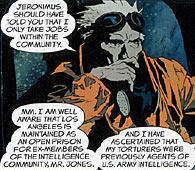 of the eye-gouging... I mean, it's gloriously violent), and the linework is, of course, superb.
of the eye-gouging... I mean, it's gloriously violent), and the linework is, of course, superb.
The lettering: My God, the LETTERING! The lettering is what basically convinced me to pick up the book, and it's marvelous, in the vein of old 50's EC comics.
So, yeah, it's a good comic. I'll be there for #2.”
I’d give the first issue of Desolation Jones a 9/10, because I’m feeling particularly nice. (The image is borrowed from Pipeline at Comic Book Resources. Look at that lettering!)
That’s aboot it, in the true Lithium area. Other comics I’ve picked up lately include Vimanarama (which concluded better than it began, and, while I didn’t fall in love with it, wasn’t really that bad. In fact, I could write a bloody paper on it. I’ll give it a 7/10 overall), Gotham Central (it’s solid as always, but I wish Rucka would write about someone other than Montoya for a change; 7/10), and JLA Classified (Giffen and DeMatteis wrapped up their arc, and it was filled with comedy, drama, heartache, love, action, more comedy, and plenty of irony. Also a 7/10.) Human Target, sadly, has ended, but it was very good (8/10), I dropped Fantastic Four after Waid left (6/10), and Astonishing X-Men gets worse and worse (3.5/10, because I'm mean. Sorry, Joss).
I’m not really a fan of either of the Big Two’s directions right now. Marvel has reached new levels of banality, and the DCU is now a mostly inbred mess of crossovers, with plots that piss me off. I’m sticking to the peripheral stuff, and you should, too.
As for the realm of television, I’ve become addicted to medical dramas now, as I’ve been watching Grey’s Anatomy, House, and ER reruns nonstop. I’m also watching the FBI drama ‘The Inside,’ mainly because a lot of Buffy crew are involved, and it’s not bad, but the ratings are abysmal, so surely it’s doomed. Alas. (I’m surely watching other stuff, but I can’t think of ‘em right now! Haha!)
As for movies, Sin City rocked, Hitchhiker's Guide to the Galaxy was alright, but th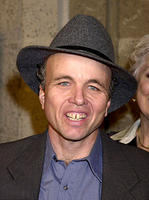 e books are better, and Batman Begins is incredibly awesome. Go see it.
e books are better, and Batman Begins is incredibly awesome. Go see it.
And the Celebrity of the Moment (#3 in a series) is... um... oh, let’s make it Clint Howard. I’ll let the unfamiliar among you do your own homework on this one, but basically he’s Ron Howard’s less famous and uglier brother. And yet he’s still cooler than you. Glavin! (Fear him!)
That’s *plenty* for now. Catch you later. (You know who you are. At least, I hope so. If you’re suffering from amnesia, e-mail me! I’ll be glad to help.)
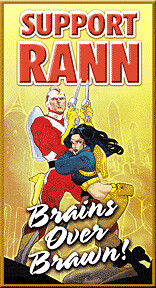
The extremely popular comedian Lewis Black has summed it up excellently in one of his more familiar routines. In this routine the angry comic goes on to explain how winter is a horribly gray period of life, and how each day gets grayer and grayer still until it’s the grayest day you’ve ever seen…and then it gets even grayer. And then, finally, everything is so gray you slit your wrists just to see color...and this day happens to be Valentine’s Day. Quite frankly, this is an excellent summation of how things seem to work.
What is Valentine’s Day supposed to be about? Well, it seems it was named after a St. Valentine, who was a nice guy and priest who was put to death on February 14th for marrying people secretly or some such. He left a note to someone saying “from your Valentine,” and this, combined with a Juno-worshipping Roman ceremony from times past involving something about couples, gave us our concept of Valentine’s Day. I’m too lazy to do a whole lot of research about it, but it seems more than a bit morbid to me.
This is sure to bring me to my point eventually. The point is, of course, that my cynical self cannot seem to appreciate or find value in Valentine’s Day, which is, after all, the most depressing day of the year, usually. Why, you ask? Well, let’s pose a question to all of you gentle readers who like the old Valentine’s Day. Why do you enjoy it? I implore you to send fan/hate mail through some means or other and let us at this fine newspapering establishment know.
Perhaps, though, I can beat you to it. Let’s think; there’s this “love” thing going around these days, like some kind of epidemic. Methinks that’s why people enjoy Feb. 14th. After all, the entire world can’t be celebrating your favorite Spanish teacher’s birthday; there’s got to be some other reason! All the happy couples seem to like it, what with all this “love” stuff going around, and the flowers and candy and cute small fuzzy animals and whatnot. While this may seem perfectly natural to some of you out there, you people are obviously forgetting about a large group of others who aren’t having the time of their lives; the lonely people.
Therefore, I suggest some kind of day for the lonely people, too. Perhaps on Feb. 15th, just to spite the happy people. I’d name it after a depressed and lonesome Saint, but I don’t know any offhand, unless you count the football team. However, I do know my Beatles. Henceforth, I declare Feb. 15th to be Sgt. Pepper’s Lonely Hearts Club Day, from here on out. I doubt I’ll be throwing candy and furry animals around or wearing a party hat, but I think maybe I can take a few moments out of my daily moping/brooding/sulking ritual to somberly acknowledge good ol’ Sgt. Pepper, who for so long sought the tender embrace of companionship, that from which he was forever forsaken. Or possibly forsook.
So you could call me a pessimist. Frankly, I think I’m sometimes too much of an optimist, which scares me. I’ve become a sad, lonely old man a few decades early. Just because I listen to depressing music, talk with depressed people, watch depressing TV, write a few depressing stories, and hide from society all the time doesn’t mean I’m some kind of crazy depressing hermit. Maybe one day, but not now! No, but I’m not a shiny happy ball of sunshine like some of you, either. I’ve seen my share of enjoyable moments, but I’ve seen a lot more depressing breakdowns. Believe you me, I understand the depressed and lonely. And it’s from experience.
Now, this article had its fair share of levity, but it also might’ve shown you that not everyone has a fun Valentine’s Day, or enjoys it too much. God knows I’ve tried, sometimes, but maybe it’s just a few traumatic memories that spoil it. Here’s my advice to you; find the nearest lonely fellow or downtrodden fellowette and give ‘em a good ol’ hug. Maybe you can help someone have a decent Valentine’s Day. Or maybe you’ll just get a restraining order. Either way, I’ll lift my glass in a toast on Sgt. Pepper’s Day. Now if you’ll excuse me, it’s time for my